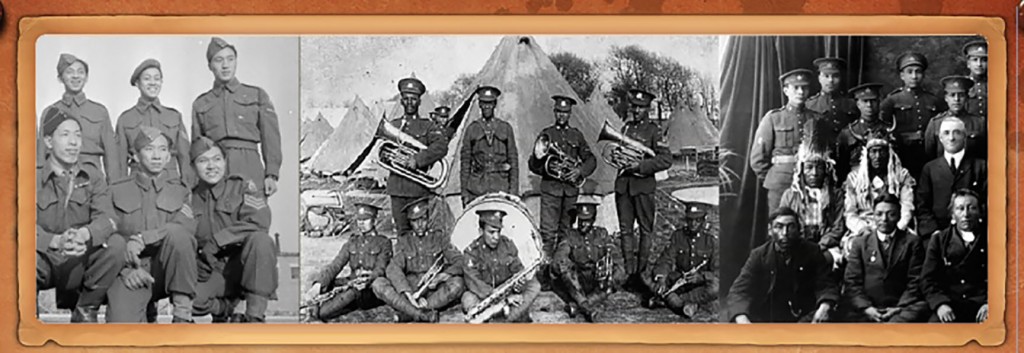Remembrance Day: The Forgotten Warriors Updated
More photos in the footer
November 11, 2019: I brought this post forward from 2015 as we are still seeing far too many negative comments from people who seem to have forgotten many of the men and women who fought and died to preserve our freedoms were from minority communities. When celebrities in positions of influence do that it is unforgivable.
This is the 2015 post:
I am still seeing far too many FB posts that confuse issues related to September-11th with our celebration of November-11th. Try to remember the defence of our freedoms during two World Wars was fought by military personnel from countries representing every race and religion around the world and while Canada, then as now, was home to a few who utter racist rants, we need to remember this is 2019, not 1914 or 1939.
It is time for everyone to accept that Canada is a multicultural mosaic where minorities are the norm, not the exception, so let’s stop trying to prove it is otherwise. The following statement is plucked from a Web Site dedicated to the memory of those who served in World War I:
(336)
Is Fiscal Conservatism Dead?
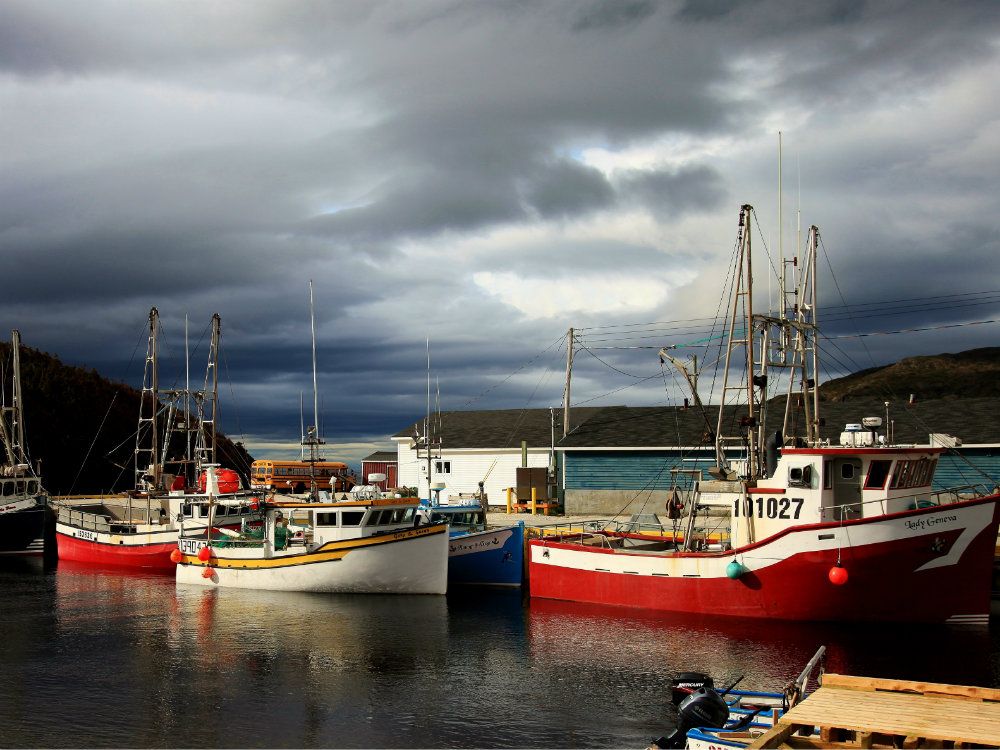
While Newfoundland and Labrador have not yet declared bankruptcy, they are on the verge.
Guess who engineered the downfall?
Oh, Danny boy, the pipes, the pipes are calling
From glen to glen, and down to oceanside.
The summer’s gone, and all the roses falling,
It’s you, it’s you who choose to quit, the rest must bide.
And, Danny Williams, the ninth Premier of the Newfoundland and Labrador, did just that. After setting the province up for failure, he walked away a hero. Was Danny as a fiscal conservative? Perhaps, but rather than setting up the Province for success as one might expect from a party and leader that preached fiscal conservatism, he and the party preferred, instead, to reap the benefits of power in the present. It’s the failing of many governments, not just the Conservatives, but it is an extra failing for the Conservatives as they profess themselves to be the party of fiscal prudence.
Related Posts
Left or Right: Is there a difference?
How to Game and Election
The SNC Lavalin Affair
The Kings of Conservative Media
The Changing Landscape of Politics in Canada
Part 1: Newfoundland & Labrador: A case study in how to fail
For those who think I have heaped to much blame on Alberta and British Columbia Conservatives for poor resource and fiscal management, let’s take a trip to the east coast for some relief. It seems the rise of Conservatism in NFLD under the leadership of Danny Williams in 2003, is eerily similar to the Alberta experience of the last two decades. This from a 2018 National Post article:
“When Danny Williams (that vibrant, outgoing, irascible, Irish politician) came to power as the ninth premier of NFLD in 2003, he promptly held a grim news conference where he warned that the provincial debt was out of control, and threatening to bankrupt the province. Fortunately for Williams, after one unpleasant budget and a nasty public sector strike, the price of oil rocketed from around $30 when he first took office, to $50 by the early months of 2005.
By the end of Williams’ first term in office, oil was flirting with $80 a barrel and it only climbed higher in his second term. Williams cut taxes and allowed spending to explode, fuelled by windfall oil royalties, right up until he quit politics in 2010, one week after he had announced a landmark deal for a multi-billion dollar hydroelectric project.
“During those good years, a few columnists, some policy wonks, and the province’s (Newfoundland that is) auditor general fretted that the government was living beyond its means, but the electorate didn’t care. After decades of crushing societal poverty, Newfoundland and Labrador was rich for a change, and Williams got credit for the economic miracle.”
(535)
A Letter to Jamie Hammond
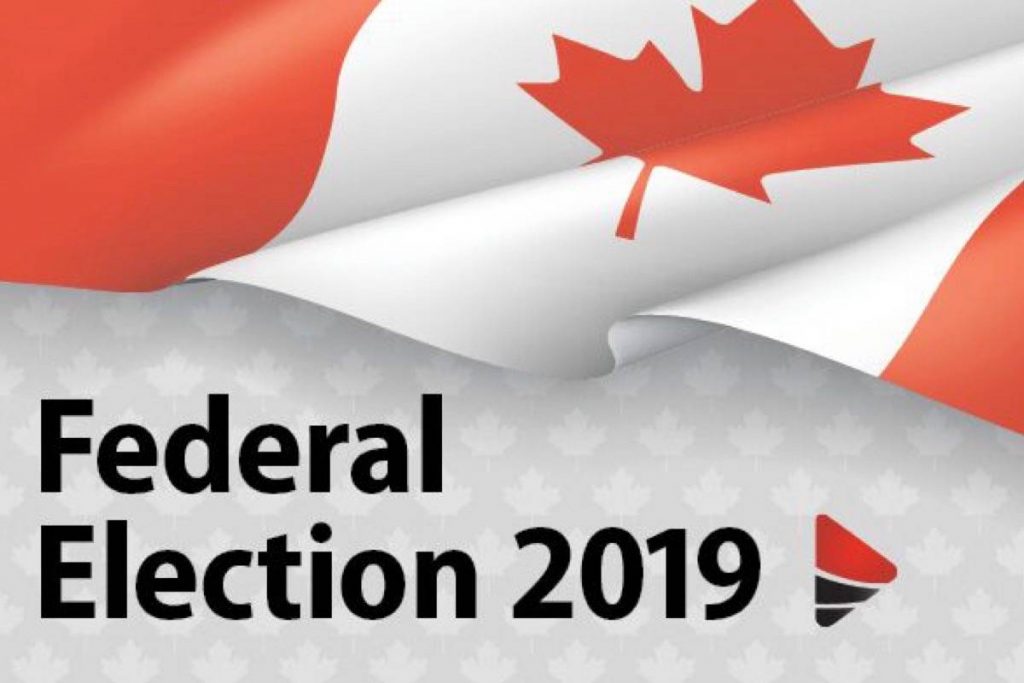
Esquimalt-Saanich-Sooke
A Letter to Jamie Hammond
October 14, 2019
Dear Jamie,
My vote in Esquimalt-Saanich-Sooke comes down to a choice between two of the three parties on the centre-left. Having just met and listened to you at two meetings, you present a clear and forceful message. (Photo Right)
and listened to you at two meetings, you present a clear and forceful message. (Photo Right)
I’m also impressed with Randall Garrison, as he comes out loud, clear and consistent in his messages. I have also watched you and Garrison on the podium. You are respectful and cheerful to one another and all other candidates. Between the two of you, you don’t hold out your political differences as being an impediment to moving forward on major issues.
There was a moment in time when you were asked a specific  question about your first priority if you won. You stated something to the effect, “my first priority would be to meet with Randall Garrison over dinner where we would discuss the files he was working on that need to be continued into the future.” That is the type of politician and party we need in Ottawa. I’m also sure Randall feels the same way.
question about your first priority if you won. You stated something to the effect, “my first priority would be to meet with Randall Garrison over dinner where we would discuss the files he was working on that need to be continued into the future.” That is the type of politician and party we need in Ottawa. I’m also sure Randall feels the same way.
Yesterday, I heard Jagmeet Singh state unequivocally he would work with the Liberals to maintain a stable government if they ended up in a minority or even if the Conservatives won a minority. It’s a great relief knowing that whichever way I cast my ballot, my vote will not be lost if the other team wins.
 Just as in my voting for David Merner the last time around (he was a Liberal then) my vote was not lost simply because Randall Garrison and the NDP won in the riding. I had worked for all three parties last time, just as I have this time around.
Just as in my voting for David Merner the last time around (he was a Liberal then) my vote was not lost simply because Randall Garrison and the NDP won in the riding. I had worked for all three parties last time, just as I have this time around.
My difference with David Merner (I consider him a friend), is that when he jumped ship from the Liberals, he turned on them with a vengeance. He still does this on a regular basis. We don’t need parties of the centre-left beating up on one another as a means to gain votes.
(275)
Left or Right? Is there a difference?
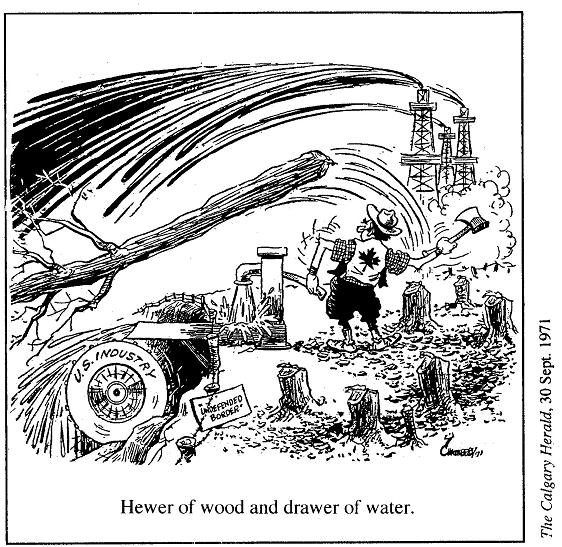
This post will tackle the issue of ‘fiscal conservatism’ and whether it still lives, or more to the point, whether it ever lived in actual practice. Of specific interest, is the management of natural resources in Alberta and British Columbia. I will later write about Newfoundland and Labrador, as NFLD and Alberta have followed almost the same path over the past twenty years (boom to bust). Just where does the fault lie?
In the following discussion, it’s suggested I lean more heavily on Alberta than British Columbia and to some extent that’s true. Part of my reasoning is that over the past forty years BC has developed strong political and public opposition to the worst instincts of government when it comes to extracting value from our resources, and with protecting the environment for future generations.
With the Conservatives now back in power in Alberta, they are again in a position to spend hundreds of millions to protect the oil companies and government from any opposition in a rapidly changing world. This is not unexpected, as over the past seventy-six years, Alberta, the most conservative province in Canada, has had neither an effective opposition nor a protest movement.
It was only in 2015, with the election of the NDP, that this changed. While the NDP was defeated this year, I think the future will be far different as there will be a rapid rise in opposition strength and it seems likely public protest will also take hold. Many articles have been written which suggest Alberta has become far more polarized (left and right) in recent years and that bodes well for the people of Alberta and Canada as the Conservatives will need to think twice about running roughshod over any opposition. (Link)
Regards,
Harold McNeill
Email: lowerislandsoccer@shaw.ca
Related Posts
Is Fiscal Conservatism Dead
Left or Right: Is there a difference?
How to Game an Election
The SNC Lavalin Affair
The Kings of Conservative Media
The Changing Landscape of Politics in Canada
Contents
1. Introduction
2. The ABBC of economic free rein: What happens when few controls are placed on how companies use our natural resources for a quick buck.
3. For richer, for poorer, in sickness and in health: life in the Alberta oilpatch (1940 – 2019).
4. British Columbia: The Scars that Bind (1952 – 2019)
5. Back to the Future
Footnotes and Charts
Appendix A (a sketch of the federal political parties)
Next Up: How the past twenty years in NFLD almost exactly parallels the rise and fall of fortunes in Alberta with, “Oh, Danny Boy, the Pipes, the Pipes are Calling.” (Coming soon).
(301)
How to Game an Election
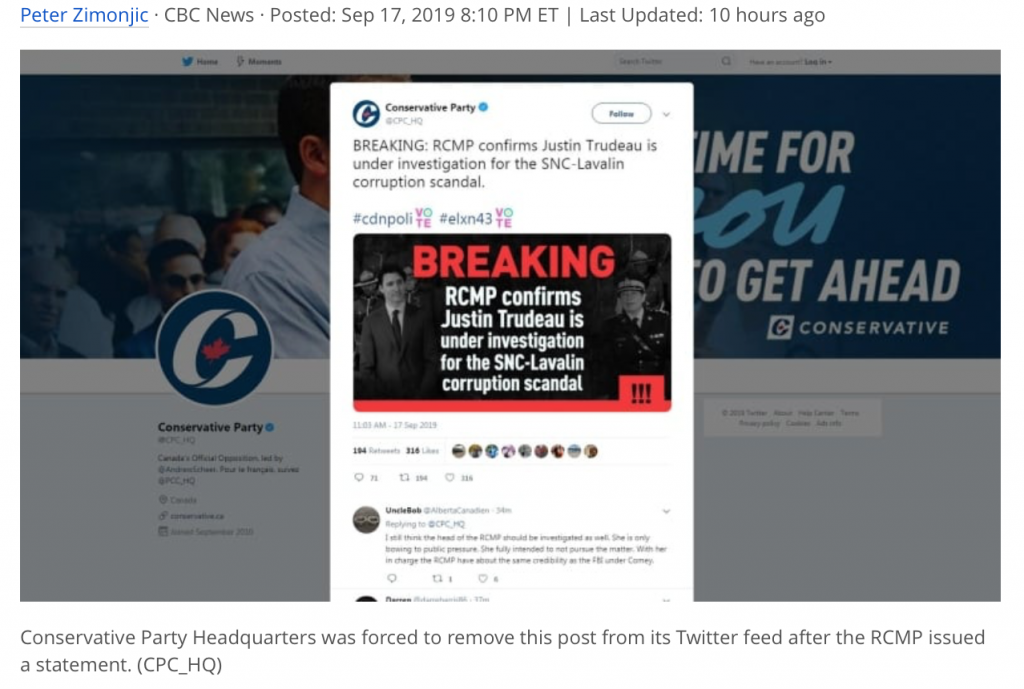
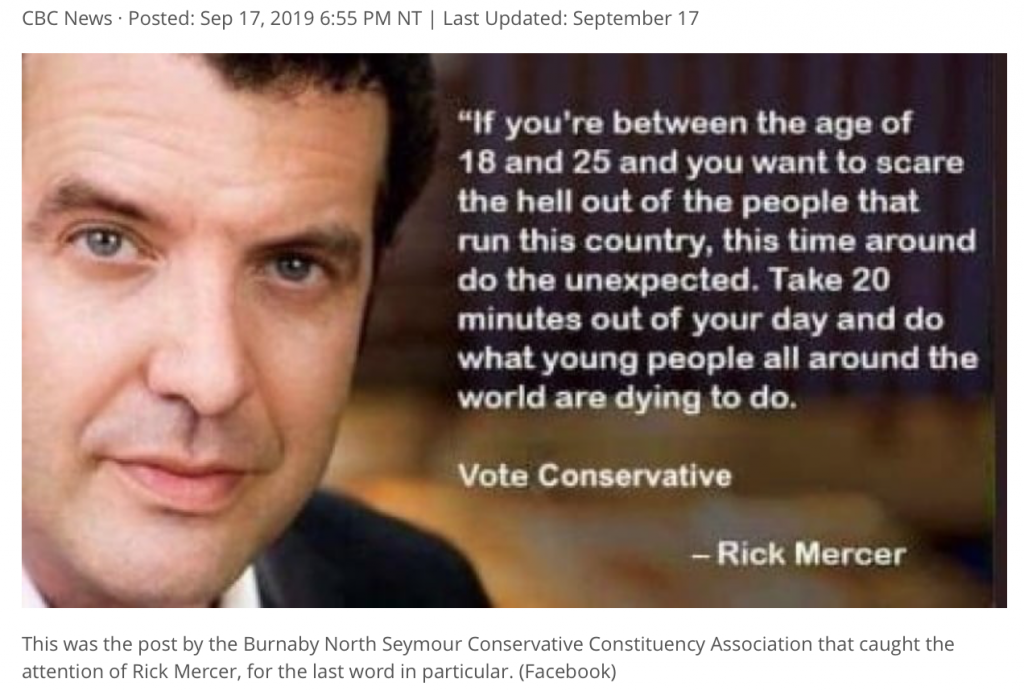
This post is written as a less provocative introduction to a nasty game being played out across the nation as we move towards the October election. Two examples of the game are provided above and both happened today (Sept 18).
One was a fake news story about the Prime Minister, and the other, the doctoring of a Rick Mercer meme. Both were discovered by CBC news. We can expect much more of this stuff over the coming weeks and most of it will emanate from the Conservative Party and their backroom social media experts.
In an election as close as the one, where every vote counts and, short of a complete disaster on the part of one party or another, social media is absolutely the best bet for gaining undecided votes. Following, are a couple of polls showing how things stood in July 2018.
Table I “Would you consider voting for one of these parties?”
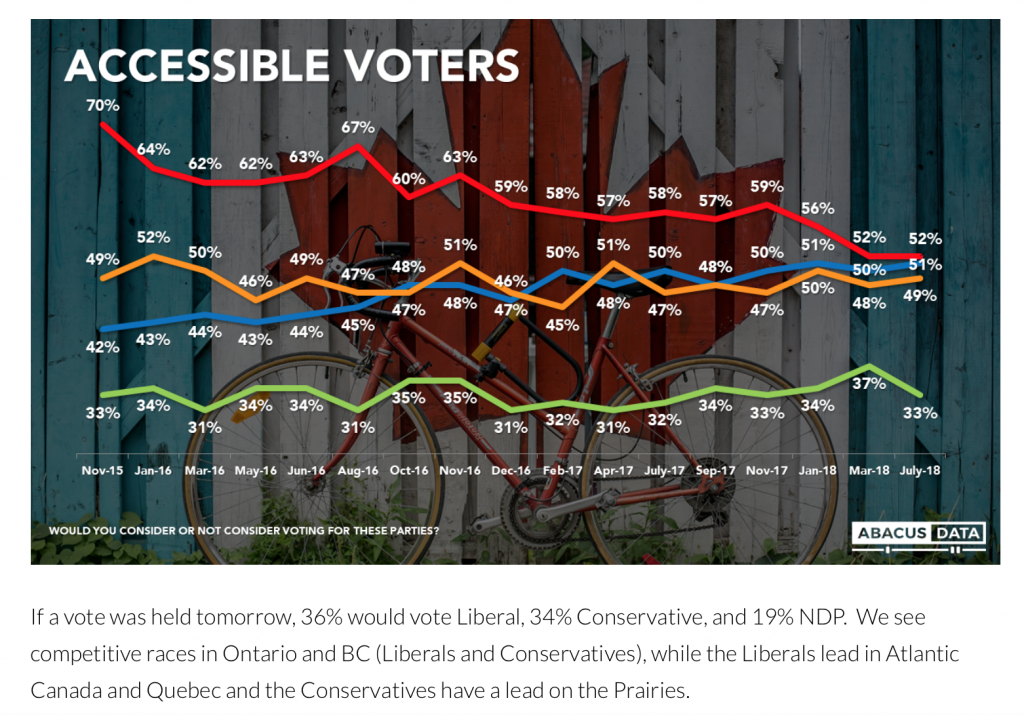
The numbers have not changed all that much over the past year. What happens to the Greens and NDP, has a considerable impact on the Liberals – not so much on the Conservatives. Clearly, the movement of voters between the Greens, NDP, and Liberals is more likely to affect the outcome of the election.
All the Conservatives need do is develop strategies to keep the Greens and NDP focussed on the Liberals while keeping their own party members solidly attached. A large part of that strategy involves heaping as much negativity as possible on the Liberals. If the Greens and NDP help them out, so much the better. Next up, the change between how you would vote in 2018 and 2019.
(305)
The King of Conservative Social Media
Update: April 29, 2022
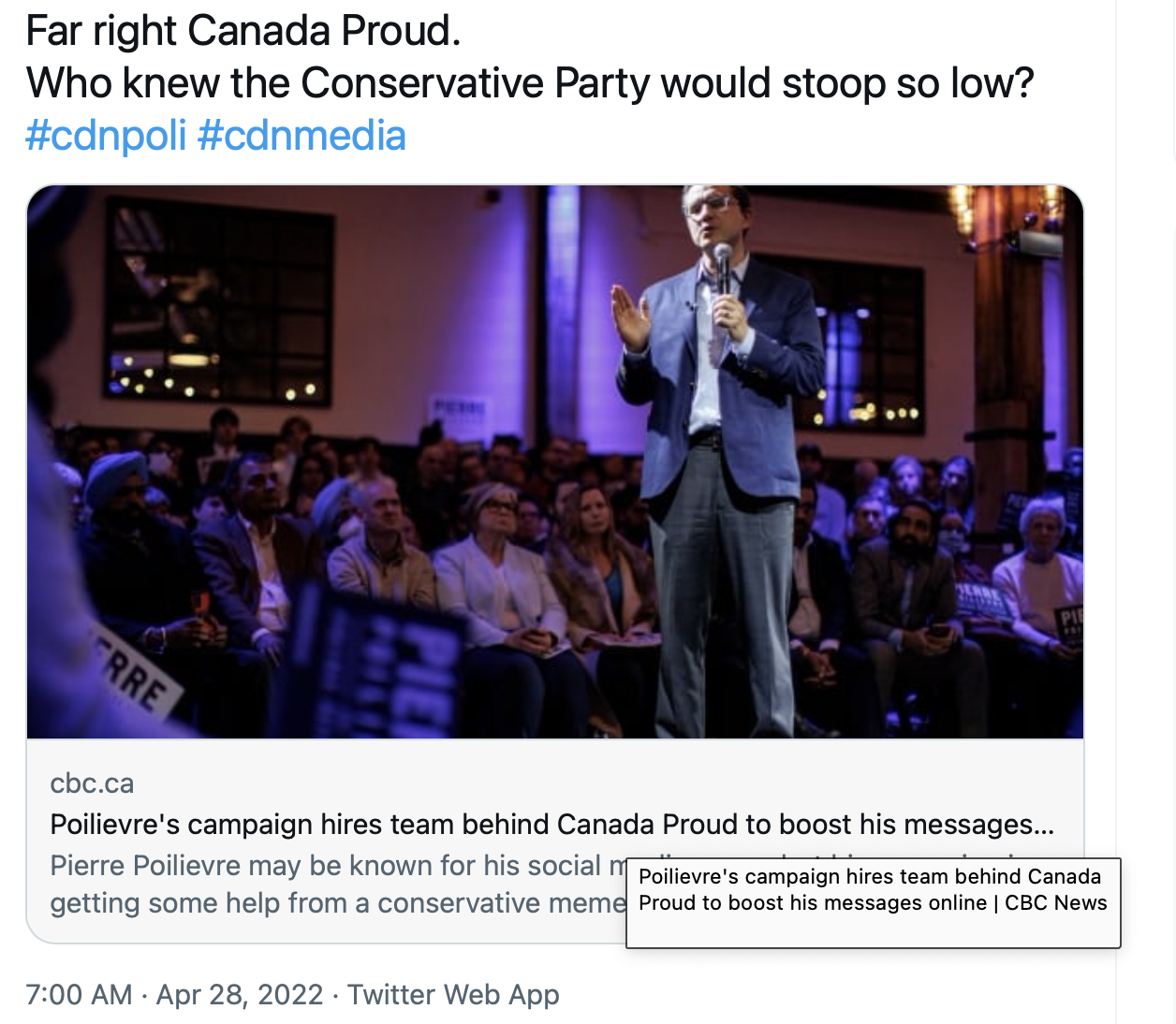
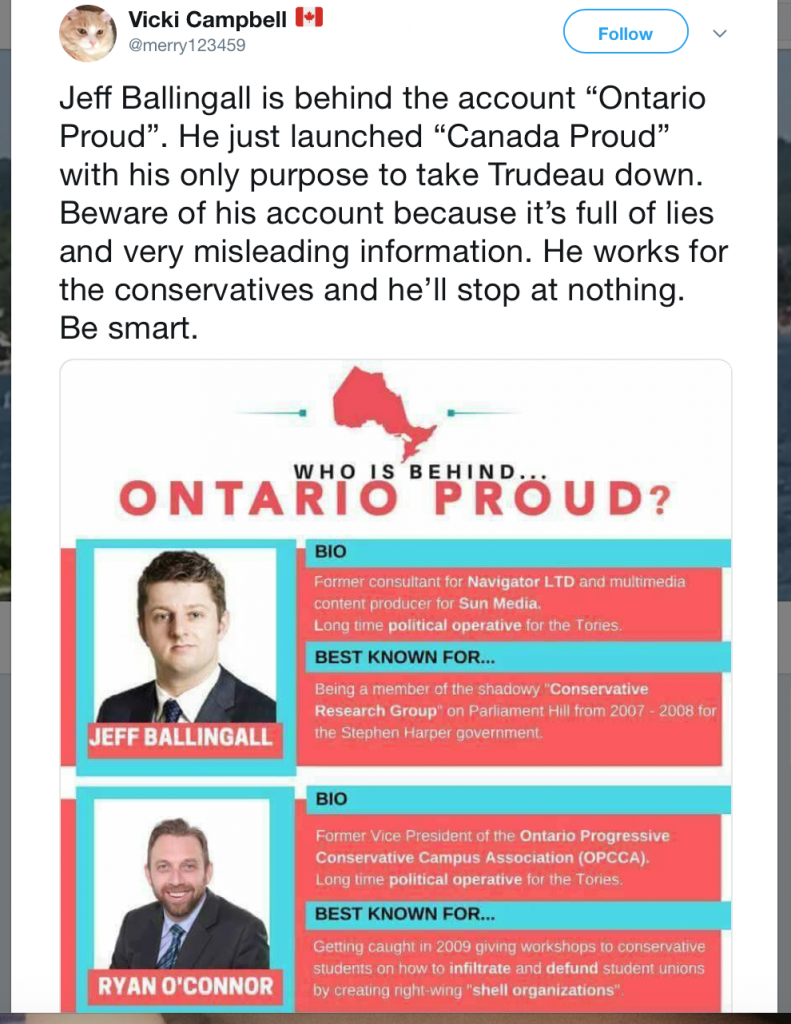
Jeff Ballingall follows in the steps of Donald Trump in using a stream of lies and disgusting meme’s to secure a win for those he supports on his Web Site
This article originally posted in 2019 following several news articles on Mr. Ballingall were the word “shitposting” was frequently used. I originally used that word it the title of this post but it made me feel uncomfortable so I changed the title to something less controversial. However, the use of shitposting tactics has propelled Ballingall and Associates to the top of the leaderboard in capturing voter attention and he could do again this October if the center-left of politics do not get their collective ducks in order.
In another major change and following the defeat of Rachel Notley (photo below), the provinces are once again dominated by an all-male cast of heavy-hitting Conservative males.
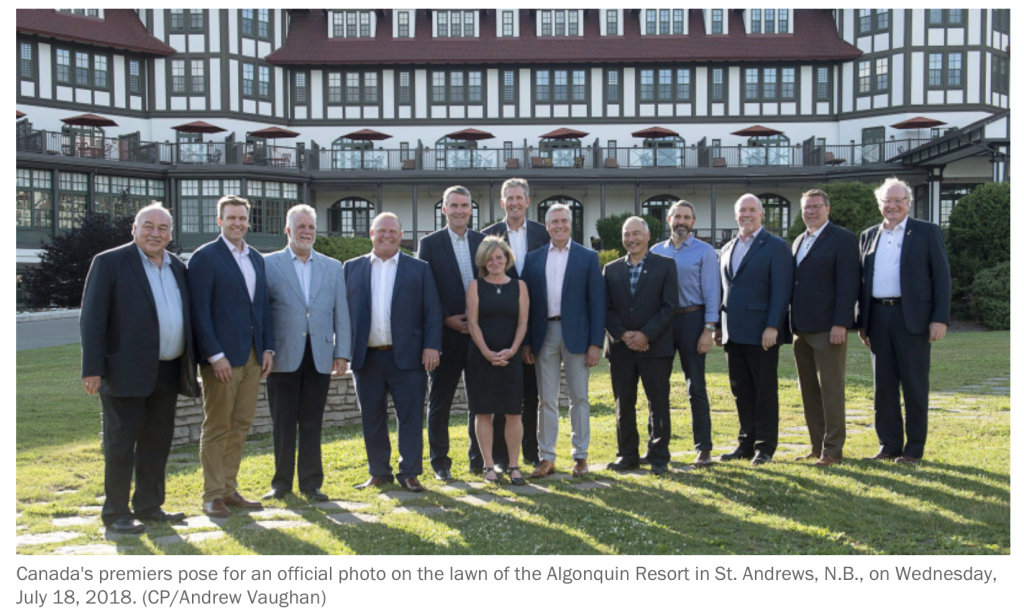
The above photo speaks a thousand words about the state of our country in terms of gender equity. Rachel Notley is now a footnote in history and if Andrew Sheer is placed in the Prime Ministers office, women will all but disappear on the Federal and Provincial scene. In case you forgot, over the past few years, women have been among the toughest adversaries on the Federal stage. Think for a moment about Chrystia Freeland the woman who took on Donald Trump and won in the NAFTA negotiations. While all was not smooth, they held their own in the dog eat dog world of politics.
Over the past few months, Ballingall and Associates carried Ford, Kenny, Moe, Pallister, Higgs, and the King of PEI on their shoulders and all now sit as Premiers in an unprecedented sweep of the country. Today, the impish, smiling face of Andrew Sheer is their poster boy, and for Sheer, the same 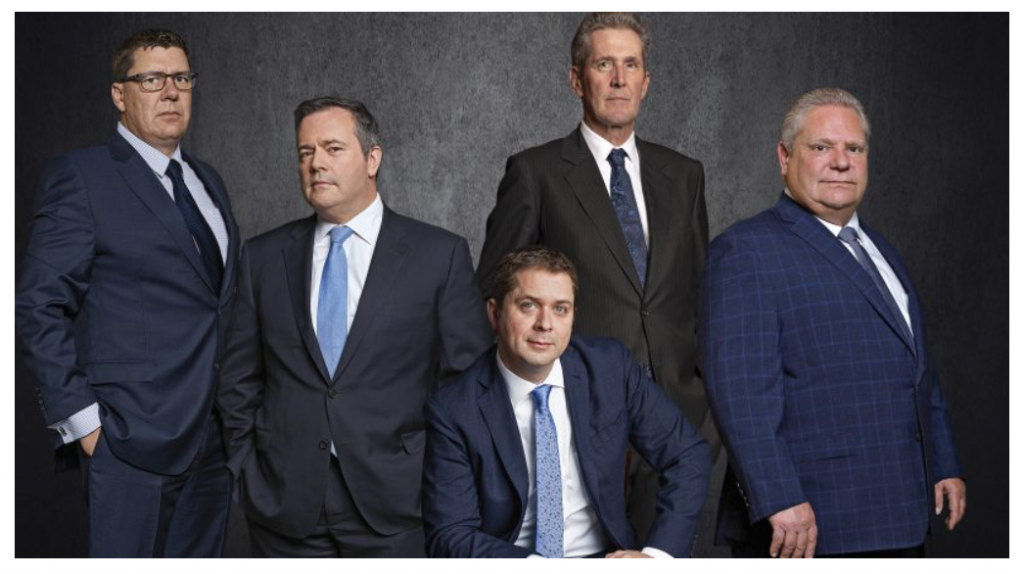 group engineered his rise to the leadership of the Conservatives over one-time party favourite Maxime Bernier.
group engineered his rise to the leadership of the Conservatives over one-time party favourite Maxime Bernier.
Some suggest a wave of populism is sweeping Canada, but I beg to differ, it’s a wave of Conservative Shitposting that makes it seem that way and it only takes a handful of populists at the core to accomplish the task. Following is a sample of the type of comment found on Ontario Proud during the provincial election and this is mild stuff across the spectrum of their posts and tweets.
“That ugly nasty greedy no good money grubbing snot faced witch”; “The ugliest human dyke who ever existed”; and “I’m surprised that no one has shot her but maybe the bullets cost to much.” (Quote from Canadaland article)
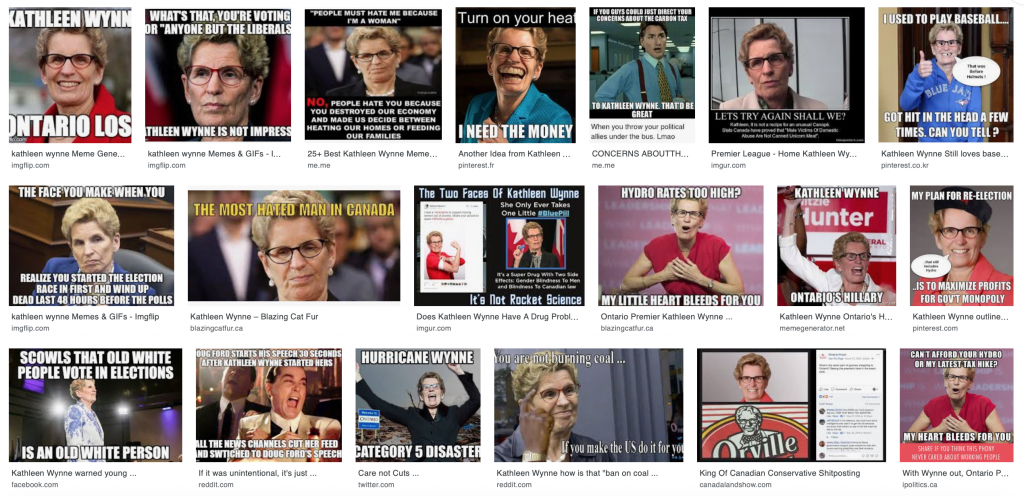
(554)
The SNC Lavalin Affair

The Greens, NDP, and Liberals hold the keys to our fight on climate change. They can either turn those keys together or they will turn our future over to those who have no interest in making the hard decisions that must be made.
SNC Lavalin and the Future of Canada
Opinions have flowed like water over Niagara Falls following the recent Ethics Commissioner’s ruling on the SNC Lavalin. As expected, opposition parties are rubbing their hands with glee, while the Prime Minister and Liberals consider the best course of action as we march towards the next election. Such is life in the arena of politics.
While there is plenty of room to criticize all parties and politicians, few take the time to consider the issues in the broader context of how things get done in a democracy. To those politicians, I suggest, “don’t rush to judgment,” on the SNC Lavalin affair or any other for that matter, you to could one day be sitting in the hot seat. Heaven knows, our former Prime Minister, Stephen Harper, sat in that hot seat often enough and, in his own way, he was pretty good even if I didn’t like him or most of his “fight everything with harsh new laws,” stance. (1)
(310)
First Nations Policing
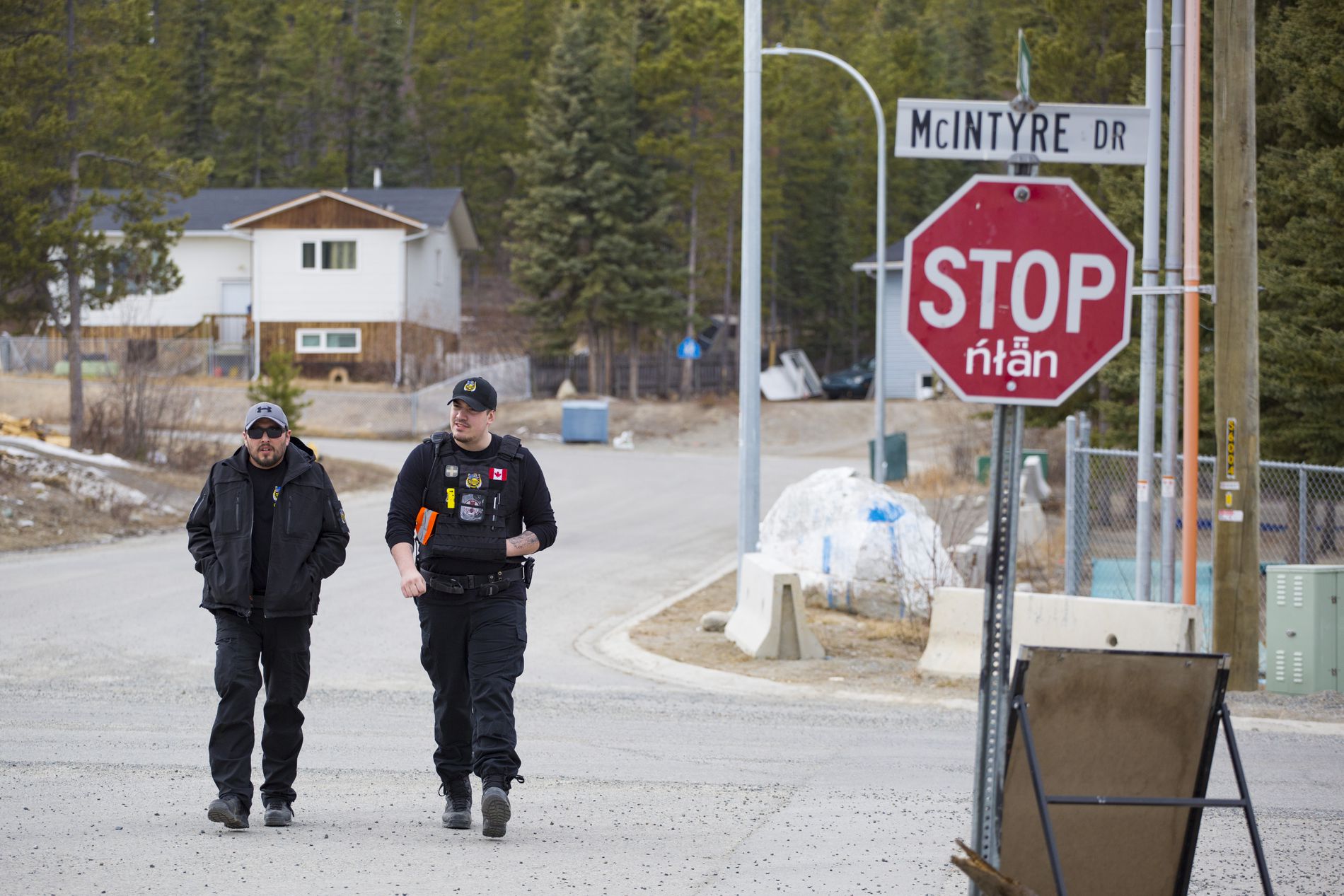 On June 24, 2019, a feature-length article appeared in the Globe and Mail,
On June 24, 2019, a feature-length article appeared in the Globe and Mail,
No Weapons, No Charges: A Yukon First Nation’s solution for keeping the peace.
This excerpt: “In Whitehorse, colonialism and crime have damaged the people of the Kwanlin Dun’s relationships with the RCMP and one another. Now, a pilot project is trying to do policing differently – earning trust and respect in the community, as well as national international attention.”
Back in the 1970s or 80s, while in the early mid-stage of my police career, I became heavily involved in promoting ‘community policing’ efforts both in Oak Bay and around the Province. At one point, I participated in several community policing workshops involving persons with various backgrounds searching for and promoting new ideas for policing. One idea that had surfaced, and seemed to hold considerable promise, became known as the “Indian Constable System”.
Following the seminar, I spent a few weeks researching the subject, then writing and distributing a paper summarizing the program. Because my interests weren’t directly related to policing First Nations lands, I never ended up doing any follow-up work. However, I did occasionally communicate with a few people who were involved, including one or two First Nations individuals who became police officers on their home reserves. Over the years, I simply lost track of how the program progressed until I read the above article in the Globe and Mail yesterday. The Globe article suggested this was a new concept.
In fact, the program in Whitehorse is almost an exact summary of that which was being researched and promoted back in the sixties and seventies. A Google search suggests that early impetus in community policing on First Nations lands and by First Nations members fell by the wayside. Neither did the search reveal any in depth information on the subject other than this summary from a BC Government Web Page:
“The province provides policing services in First Nations communities in rural areas or in First Nations communities in municipalities with populations up to 5,000. Municipalities with populations greater than 5,000 provide policing to First Nations located in their boundaries.
The Stl’atl’imx (Stat-la-mic) Tribal Police Service is the only First Nations administered police force in British Columbia. The Stl’atl’imx Tribal Police Service is a designated policing unit under the Police Act. It is like an independent municipal police department and has a police board comprised of community members.
Stl’atl’imx police are experienced officers or graduates of the Justice Institute of British Columbia. Its officers are appointed under the Police Act.
The First Nations Community Policing Services (FNCPS) program provides many First Nations communities across the province with police services. This enhanced local police service is provided by additional RCMP members who are familiar with First Nations’ cultures and traditions.
See First Nations Policing for more information.
This lack of information on Google suggests a program that held out great promise back in the mid-late part of the last century simply fell by the wayside. I wonder what happened that forty years later, we are now again just looking at this as being a program with great promise. I find it most perplexing and shall try and dig out that old paper and see what was actually being promoted so many years ago.
Harold McNeill
Oak Bay Police
Det/Sgt (retired – 1994)
(150)

